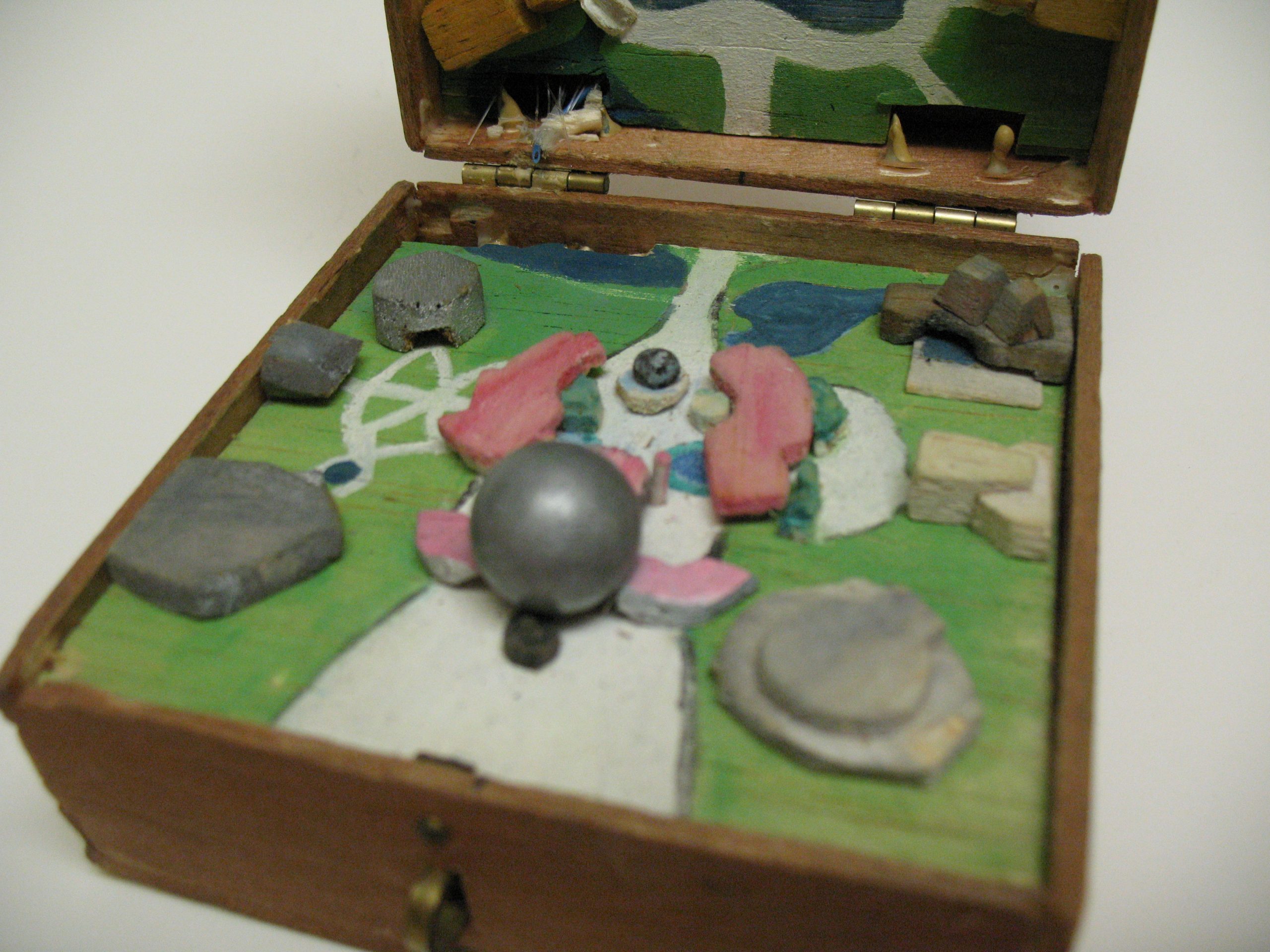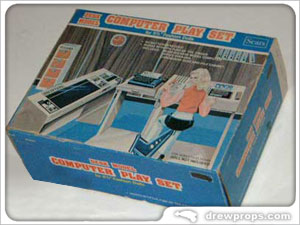 I was doing some spring cleaning today and ran across this awesome “Computer Play Set for 11.5″ Fashion Dolls” and thought I ought to post it to the site for all you true computer nerds to drool over. Heck, if Intel’s willing to pay US$10,000 for a dumb old computer magazine maybe there’s a rich dot-com billionaire out there willing to drop some decent cash on this little gem.
I was doing some spring cleaning today and ran across this awesome “Computer Play Set for 11.5″ Fashion Dolls” and thought I ought to post it to the site for all you true computer nerds to drool over. Heck, if Intel’s willing to pay US$10,000 for a dumb old computer magazine maybe there’s a rich dot-com billionaire out there willing to drop some decent cash on this little gem.
I found this thing at a local pharmacy that antique collectors only dream about, the kind of place where the owners buy strange merchandise that nobody wants to buy and is eventually moved to back shelves to linger for the ages and gather dust. Back in the 1970’s I remember staring up at the toys arrayed on top of the shelves behind the counters. They had all sorts of weird and wonderful and absolutely unlikeable things. Old MEGO action figure playsets, strange tin toys, terrible games featuring celebrities-of-the-moment like Mork and Fonzi.
The exact kind of stuff that I desperately wanted twelve or thirteen years later when I began to have smatterings of disposable cash. By the time I began looking for those wonderful toys they were all but gone. The only things I could find were two small action figure playsets: the remote-control Planet of the Apes horse and this weird thing. While I’m sure that there are tons of websites featuring the remote-control Planet of the Apes toy horse I strongly suspect that I may be the only person on the planet who has one of these things.
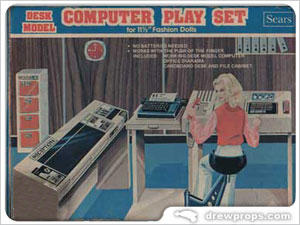 Let’s look a little closer at the front of the box. You’ll note that this is a “Desk Model” Computer Play Set. What other types of computer models were there in the 70’s? Note how happy the sexy computer operator is, sitting in her Dr. No style floaty bucket seat. This code monkey Barbie doll has her red telephone receiver in her left hand and her button-pushing finger ready to go on her right hand. The reel-to-reel is cued up and there’s something on the typewriter thingy to her left. If I didn’t know better I’d guess that she was looking over at a large-bed HP printer, but inkjets were just a twinkle in some engineer’s sliderule at that stage of the game. Gosh, I’m not doing all that well at guessing what all this stuff is… let’s flip the box over and look on the back for more information.
Let’s look a little closer at the front of the box. You’ll note that this is a “Desk Model” Computer Play Set. What other types of computer models were there in the 70’s? Note how happy the sexy computer operator is, sitting in her Dr. No style floaty bucket seat. This code monkey Barbie doll has her red telephone receiver in her left hand and her button-pushing finger ready to go on her right hand. The reel-to-reel is cued up and there’s something on the typewriter thingy to her left. If I didn’t know better I’d guess that she was looking over at a large-bed HP printer, but inkjets were just a twinkle in some engineer’s sliderule at that stage of the game. Gosh, I’m not doing all that well at guessing what all this stuff is… let’s flip the box over and look on the back for more information.
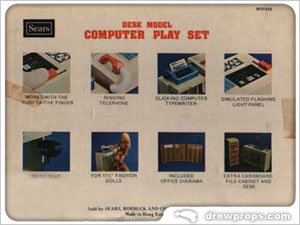 Ah, now we’re getting somewhere. This thing was made in Hong Kong, sold by Sears, Roebuck and Company and has part#4931313. And there are names for things. That’s a ringing phone, a clicking computer typewriter and a simulated flashing light panel. Oh cool, there’s an included office diarama inside. Funny, I thought it was spelled diOrama. Must be a Hong Kong thing. No matter, I want to see the extra cardboard file cabinet and desk… I always loved paper models. Even perhaps paper models of tacky 1970’s style wood paneled office walls and badly drawn furniture. I have a great imagination.
Ah, now we’re getting somewhere. This thing was made in Hong Kong, sold by Sears, Roebuck and Company and has part#4931313. And there are names for things. That’s a ringing phone, a clicking computer typewriter and a simulated flashing light panel. Oh cool, there’s an included office diarama inside. Funny, I thought it was spelled diOrama. Must be a Hong Kong thing. No matter, I want to see the extra cardboard file cabinet and desk… I always loved paper models. Even perhaps paper models of tacky 1970’s style wood paneled office walls and badly drawn furniture. I have a great imagination.
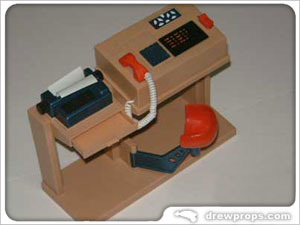 Opening the box I suddenly remembered that those cool paper cabinets and desks were already missing when I bought the thing, but still, no matter… the holy grail was intact inside. The plastic computer desk station for the “Fashion Dolls”. Wow, the blocky red telephone’s cord is still in excellent shape and it fits right into the indentations molded into the desktop. The entire keyboard of the “clicking computer typewriter” goes in and out as a single button. It doesn’t so much click as it… just doesn’t make any noise at all. I’ll let somebody else in the far flung future push it harder, I don’t want to break it. The back of the packaging says that the computer “works with the push of the finger”. This is false advertising, the computer doesn’t do a damned thing but ring like a bicycle bell when you flip that red button. Well, a multi-colored spinning wheel spins inside the desk when you flip it, “activating” the “simulated flashing light panel”.
Opening the box I suddenly remembered that those cool paper cabinets and desks were already missing when I bought the thing, but still, no matter… the holy grail was intact inside. The plastic computer desk station for the “Fashion Dolls”. Wow, the blocky red telephone’s cord is still in excellent shape and it fits right into the indentations molded into the desktop. The entire keyboard of the “clicking computer typewriter” goes in and out as a single button. It doesn’t so much click as it… just doesn’t make any noise at all. I’ll let somebody else in the far flung future push it harder, I don’t want to break it. The back of the packaging says that the computer “works with the push of the finger”. This is false advertising, the computer doesn’t do a damned thing but ring like a bicycle bell when you flip that red button. Well, a multi-colored spinning wheel spins inside the desk when you flip it, “activating” the “simulated flashing light panel”.
All in all this is an exceptionally crappy playset and accurately represents the reality of the job of computer programming in the 1970’s. If only the folks behind GI Joe had been as honest with us.
So, any of you computer mega-billionaires want to buy this thing? The bidding begins at $50,000.


